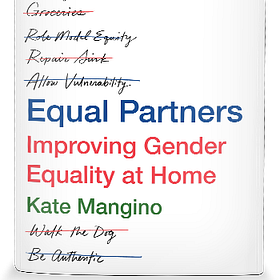A year or so ago, I shared a draft of my book with several friends and colleagues. Two readers got back to me around the same time with opposing suggestions for improving the manuscript:
Go a little easier on the men, said one.
Don’t let the men off so easy, said the other.
Many of the critical comments I receive, whether here on Substack or in response to public talks, fall into these same camps. One set of annoyed readers/listeners (most of them, admittedly, men) tells me I’m wrong to assume all relationships are imbalanced in ways that favor men. Often, they offer their own relationship as a counterargument. Or, they critique me for my (perceived) assumption that when a different-gender relationship is imbalanced or unequal, it’s because he’s doing something wrong.
But I also hear from folks (most of them women) who think I’m naively optimistic about problems inherent to heterosexual relationships. Men, they suggest, may be good at talking the feminist talk—many, not even that—but they rarely walk the walk. Giving them the benefit of the doubt only further perpetuates women’s exploitation.
To mark (nontraditionally, I’ll admit) Father’s Day this year, I thought I’d share my response to these critiques. I agree with both camps. But I also think both miss crucial parts of the picture.
First, to those in the “not all men” camp: we’ve got to separate individual different-gender relationships from gender relations writ large. When I write about gender inequality in household labor, I’m rarely trying to make a judgment about any particular relationship, let alone yours. I’m trying, instead, to describe a social pattern that cuts across lots of relationships.
It’s entirely possible for a couple to share the mental and/or physical load relatively equally, or even to put more on his plate – I’ve got a whole chapter about couples like that in the book. But my own and lots of others’ research suggests that, numerically speaking, a much more common scenario is for women partnered with men to have less power and do more unpaid labor.
It’s also quite common for partners to have very different assessments about how much each of them is doing for the family. And when we map people’s subjective assessments of their workload onto alternative metrics like time diary data, we often see that both men and women exaggerate their contributions—but at least some studies suggest men tend to exaggerate more.
Given all this, I suspect some of the men I hear from are in that minority: they do 50% or more of the housework or childcare. That’s great! It doesn’t change the broader pattern.
And I suspect others carry a smaller share than they think - by definition, not everyone can be above average.
Others still may acknowledge, at least on some level, their secondary role in household labor, but they bristle at the insinuation that it’s their fault or that this makes them a bad guy.
That’s the thing, though. I don’t think doing less than your fair share of the work necessarily means you’re a bad guy. (This is where I start to piss off the other camp…)
Because “being a bad guy” is difficult to measure systematically, I don’t have great data to point to here. But both my research interviews and my personal experiences have convinced me it’s entirely possible to have good intentions yet end up reproducing patriarchal norms anyway.
(Of course, there are plenty of guys with bad intentions running around out there. If you’re partnered with one of them, I’m sorry.)
Patriarchy doesn’t operate solely, or even mostly, on individual intent. It’s a system that affords men as a class higher status than women as a class. Because most of us are socialized into that system from the start, conscious disavowal of male superiority isn’t enough to prevent us from perpetuating it.
But that doesn’t mean individual men should be let off the hook. As I wrote last week, you can acknowledge systemic obstacles without succumbing to them.
And arguably, the “winners” in any hierarchical system – whether race, or class, or disability, or gender – have a particular obligation to do more than merely avoid bad behavior. Not being a misogynist isn’t the same as being a feminist. A vague intention toward fairness and doing your part isn’t equivalent to regular reflection on your behavior or going out of your way to counter the forces that steer more power and privilege your way.
Villainizing men, whether individually or collectively, is certainly cathartic. And catharsis has its place! Publicly calling out bad behavior can also be a form of consciousness-raising. When we collectively declare something “not okay” or tell a woman “you deserve better,” we empower some women to get away from bad guys, and we prompt others to push the well-meaning-but-ineffective guys in their life to try harder.
But as any competent therapist will tell you, few people are motivated to change when they’re feeling attacked. And so, when the goal is to help people improve flawed-but-functional relationships or, better yet, spark social change on a broader scale, assumption of bad intent is, I fear, counterproductive.
As someone who writes publicly about these issues, I try to walk this fine line: acknowledging that men are the chief beneficiaries of patriarchy without automatically assuming ill intent.1
I don’t always get it right. It’s tempting, sometimes, to lean into the “ugh, men” rhetoric – not least because rage seems to get a lot more clicks than nuanced analyses of systemic issues. And a lot of days (especially recently, as I watch some of the worst parts of patriarchy elevated to national prominence) I’m really, really angry! Righteous indignation is an important tool in the feminist toolkit.
It’s not my personal go-to, though. I didn’t become a sociologist by accident. Individual behaviors don’t happen in a vacuum, and I find it more interesting to examine the larger systems shaping them. Plus, I find it too depressing to contemplate the alternative, that most men do have bad intentions.
To the dads reading this because they’re committed to putting in the work to go against the grain: thank you, you’re awesome, we need more of you.
And to the dads who mean well in a vague and not-always-effective way: keep going, you’re on the right track. It may not be your fault, but it is your responsibility to keep trying to do better.
One writer who I think walks this line really well is Kate Mangino. If you haven’t read her book Equal Partners, I highly recommend it. You can also read my interview with her here:
Bringing men into the conversation
Over the past few years, a mini-genre we might call household labor self-help has sprung up. There’s Fair Play and All the Rage and How Not to Hate Your Husband After Kids and Fed Up. I’ve read—and recommended—several of these titles, but I wasn’t convinced we needed another one. But I’m a sucker for *early access*, so when







Great post! I had a similar back and forth with my editor when writing my fatherhood book - wanting to celebrate and praise men who are great dads, but also not making excuses for men who refuse to participate in childcare. (I'm very excited to read your book!)